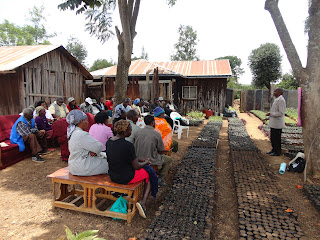By Bett Kipsang'
It is no doubt; women play a critical role
in conserving the environment. Women on the other hand are more likely to suffer from environmental degradation than men.
 |
| Jane Wangari Watering the Seedlings. (Photo by Bett Kipsang') |
Jane Wangari Muchiri, a grandmother
from Wangwachi location in Laikipia west is putting up an impressive campaign
to demonstrate the profitability of establishing tree nurseries.
Jane acquired her skills of establishing commercial tree
nurseries when she attended a seminar four decades ago. In 1969, Jane and other farmers went to a
seminar at Njabini Farmer Training Centre where they were trained on how to establish
and manage tree nurseries and other farming methods. ‘‘After the training, I realized
that it was cheaper to establish a tree
nursery than to buy tree seedlings’’ Said Jane as she produced a certificate of participation which she
had studiously kept for the last 43 years.
She
has also attended other seminars on leadership, group's by laws, leader’s roles
and participated in the National Agriculture Livestock extension Program
(NALEP), as a member of the focal area development committee. Her rich
background in capacity building through training workshops and seminars have
contributed to improved farm practices in her ten acre piece of land. She has fruits
like oranges, mangoes, Bananas.
However, the demanding task coupled with her
advanced age is now overwhelming for her and that is why she resorted to the
less demanding duties like setting up a tree nursery.
 |
| Jane's Nursery serves as training ground for the community |
She has dug a shallow borehole in the compound to
provide water for domestic needs and to water her 24,500 tree seedlings in the
nursery located within the homestead.
Jane has mastered the skills of collecting tree seeds and carefully sowing them in nursery beds. ‘‘Due to group challenges, I chose to work alone, nurseries are demanding and delicate and any slight negligence can lead to heavy losses as young trees can easily dry up’’ said Jane.
Jane has mastered the skills of collecting tree seeds and carefully sowing them in nursery beds. ‘‘Due to group challenges, I chose to work alone, nurseries are demanding and delicate and any slight negligence can lead to heavy losses as young trees can easily dry up’’ said Jane.
Her nursery has an assortment of several kinds
of trees, all are doing well. Jane observed that, in the recent past it
was hard to market tree seedlings, but with the coming in of environmental
programs like ALIN, Community Forest Association (CFA) and SCODE, Jane has had
a sigh of relief. ‘‘CFA is buying seedlings for planting to re-establish the Lariak forest and first priority is given
to members who has nursaries’’ Said Jane.
Being a member of the CFA has given her an
upper hand in marketing her seedlings. ‘‘The organization has booked seven
thousand seedlings in my nursery and I expect to receive a cheque soon’’. Jane said with a broad smile.
She is also a member of TIST, an
organization which keeps records of trees planted and compensates farmers for
the carbon credits earned from trees over one year old. Jane observed that nurseries
are now very profitable and have a big potential in the area. She told the Ng’arua Maarifa Centre that one
million tree seedlings are needed for planting in Lariak forest but the forest
officers have not had enough from local nurseries in six locations.
‘‘Am now targeting to attain 50,000 tree seedlings in my nursery because
am aware that many organizations are now out to support establishment of tree
nurseries and there is ready market due to climate change awarenes’’ she said.
Jane Wangare has earned close to 40,000
Kenya shilling from the sale of tree seedling, some of the money were ploughed
back to expand the nursery. She is now
expecting the highest returns from the current stock.
Jane Wangari not only sell all her seedlings but has also
planted 110 trees and is planning to increase the area under trees to four out of
her ten acre piece of land. ‘‘A big portion of my farm in now lying idle or
untended, due to my age, but am finding the small plot under tree nurseries more
profitable and easy to manage’’ Said Jane.
This kind of work is however not a walk in
the park for many women Like Jane. There are many challenges to contend with
that can lead to setbacks due to heavy losses and difficulties at work.
There is need for sufficient starting
capital to afford seeds, tools and pay casual labor to supplement her efforts. Tools
like wheelbarrow and a stable source of water are key to making the work
forthcoming.
The prices of tree seedling are relatively low; currently a seedling goes for ten shillings an improvement from five
shillings in 1995.
Jane is appealing for support to enable her
buy a water pump, so that she can easily move water from the borehole to the
nursery.



